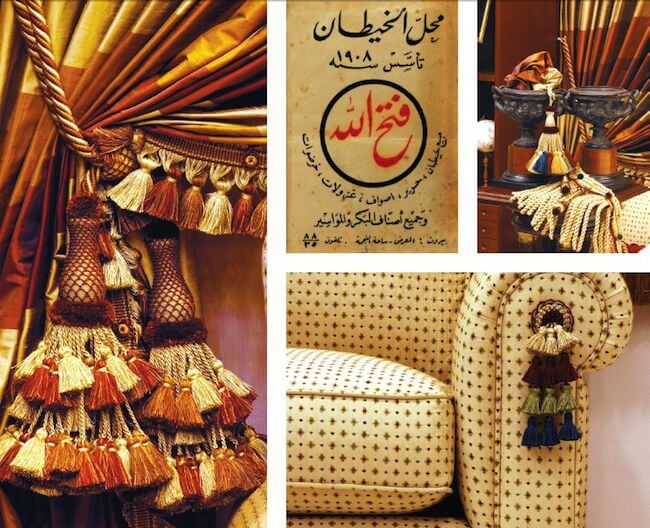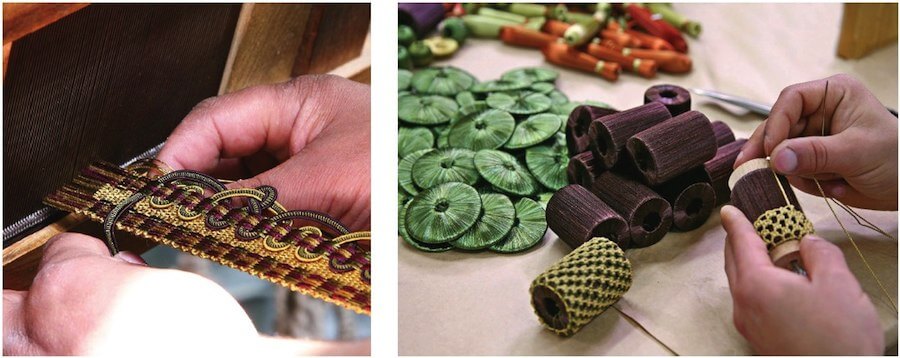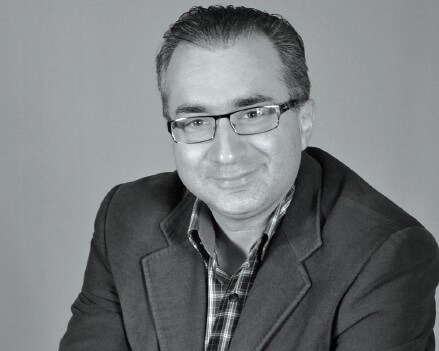The Chararib business traces its beginnings back to 1908, when the Fathallah family started operations in a small trimmings factory located on Maarad street, in the heart of Beirut. From one generation to another, the firm succeeded to transmit and enrich the know-how and the quality of its interior decoration products, and to build a prestigious name in the Middle East. Today, the family business designs and supplies products and, managed by the third and fourth family generation, continues to thrive. Tharawat magazine explores the family history and speaks to Zahi Fathallah, Operations Manager at Chararib, and fourth generation family business member about the craft that has impassioned his family for over a century.
In 1908 Mosbah Fathallah, a man who had much entrepreneurial flair and knew how to develop new business ideas, set up his own company. His trimmings business attracted many Beirutis who wanted to decorate their furniture and curtains. Mosbah’s two sons Khaled and Mostafa started to work with him and in 1953, they encouraged their father to move production to a bigger factory in El-Nahr. Two years later, Mostafa left the business to venture into construction and contracting in Saudi Arabia. Khaled continued to take care of the family business on his own. He had two sons and four daughters. His eldest son Mounir later became a prominent lawyer in the Middle East. However, Oussama, Khaled’s youngest son, got involved in the family business at a young age. He worked alongside his father learning the skills and secrets of the passementerie craft (the art of making elaborate trimmings or edgings).In 1962, Oussama succeeded his father as the head of the company and devoted his life to developing the family business. During the 70ies, he moved the factory to Bauchrieh to accommodate a larger workload. In the 90ies, he expanded to a new factory in Mkalles along with a new showroom, as the business demanded a bigger space with more machinery, labour and products display. The brand name “Chararib” was created in 1998 to represent the Fathallahs commitment to quality, creativity and customer support.
For over four generations the family has remained true to the tradition of crafting top-quality and distinctive trimmings assuring that all elements, harmony of colors, choice of materials, and originality of designs work together. The family’s custom-made strategy has never changed, and it still delivers high-end trimmings for curtains and furniture with a great range of design choices.
Q&A with Zahi Fathallah – Operations Manager of Charib Lebanon
Zahi Fathallah is the Operations Manager of Chararib and belongs to the fourth Fathallah family generation to manage the business. He joined the family business while he was still a student at the American University of Beirut. He even chose his field of study, Business Administration, because he wanted to pursue a degree that would help him in developing the company. Zahi always had the intention to join the family business and used to spend his summer breaks at the factory following his father and accomplishing happily some small tasks he used to assign to him. He later went to Italy where he learned Italian and was trained in the fine art of trimming. Today, Zahi works in the business with his father who is the General Manager and his brother who is in charge of business development, together sustaining and growing the family legacy.

In your opinion, what were the main contributions of each of the three Fathallah generations to the family business?
Each generation has added value to the continuity and success of the family business. The previous generations showed entrepreneurial spirit in choosing this specific industry for its business venture, and developing a niche market for its products and services. Our core competence is based on learned secrets and know-how transmitted to us from the former generation: We have accumulated our experience over more than 100 years.
Moreover, the elder generations established a name that we are proud of. They have built our reputation in the market. Our customers and suppliers work with us based on the trust we have generated during the years. On the other hand, we should remember that it is as hard to keep a business great, as it is to build it. The new generation of the family business is continuously developing the company. We are adopting new technology, opening to new international markets and upgrading the standards of our services. Today, our products and services can easily compete with European and American firms.
The Chararib company has enriched the interior design world in the Middle East since its establishment in 1908, how did the family succeed in transferring the craft from one generation to the next?
Since 1908, each generation was happy to get involved in the family business at an early age and learn the craft of making trimmings. Moreover, we have some non-family employees who are as loyal as family members, who got trained by our grandfather and kept working with us.
All our products are skillfully designed and made. Many of our hand-woven trimmings are still produced on a late-nineteenth-century hand looms. Because of the type of product that we make, we still use traditional craft techniques; however, while we preserve these old techniques we also regularly innovate on methods and designs.

Your family business has been in existence for over 100 years. What are the main challenges that the family business faced in its long history and today?
Being a “Lebanese” family business and headquartered in Beirut, the political and economic instability of the country has been our main challenge. Based on current and recurring circumstances, the continuity and success of the family business is a challenge in itself.
What are the family’s future plans for the Chararib company?
We already have a strong regional presence in markets such as the UAE and Qatar. We are currently working on expanding to European markets and developing our existing relationships with our European and American partners. Moreover, we are expanding our main factory and venturing into a new product line of interior accessories.
As a sustainable family business what is the best advice that you can give to family businesses in the region?
Being a family from the Middle East brings many advantages. Our culture encourages the sense of belonging and the strong ties help the family firm motivate managers and employees to work harder for the well-being of the family company. No amount of business success, however, can ever make up for a family failure. If the family is not working right, sooner or later, it will bring down the business.
Addressing the young generation of family businesses, I would like to add that we should be proud of the heritage of our firms, and because we are part of it we should dream, dare, and do more towards developing our family businesses.
Tharawat Magazine, Issue 14, 2012
















